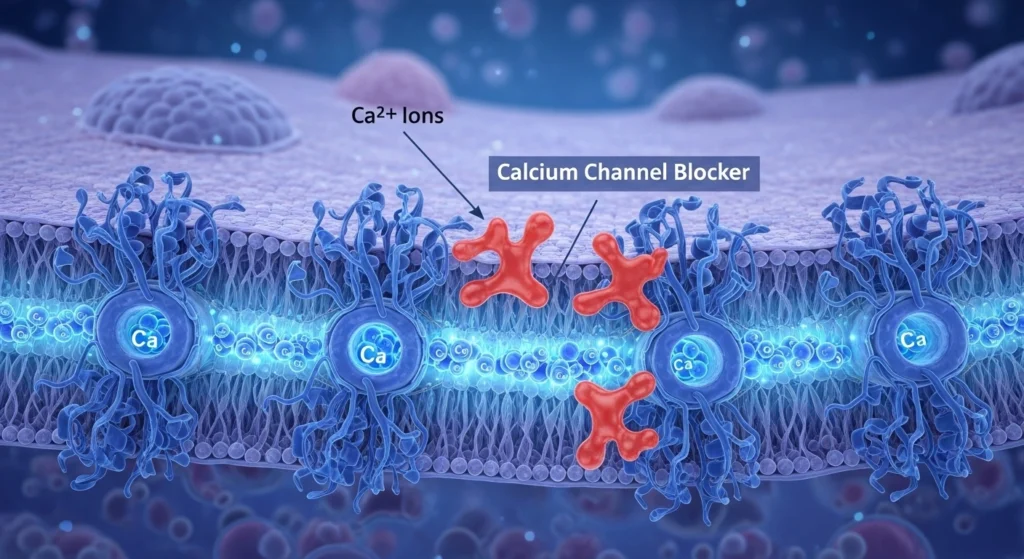Summary
Calcium Channel Blockers and Hair Loss: Calcium channel blockers, commonly used for heart conditions and high blood pressure, may cause hair loss in rare cases.
While hair loss from these medications is uncommon, it can occur due to changes in blood flow or hormonal fluctuations. If you experience hair thinning, consult your doctor to explore alternative treatments or solutions. Hair regrowth is possible once the medication is adjusted or discontinued.
Introduction
Many individuals take calcium channel blockers to manage heart conditions and high blood pressure. However, an increasing number of people are concerned about whether this medication could lead to hair loss.
In this article, we will explore whether calcium channel blockers cause hair loss, how they affect hair growth, and the steps you can take to address any related concerns. Understanding this connection can help you make informed decisions and find appropriate solutions.
What Are Calcium Channel Blockers?

Overview of Calcium Channel Blockers
Calcium channel blockers (CCBs) are a type of medication commonly prescribed to manage hypertension (high blood pressure), angina (chest pain), and other heart-related conditions. These medications work by blocking calcium from entering the cells of the heart and blood vessels. As a result, the heart doesn’t have to work as hard, and the blood vessels can relax, reducing blood pressure and improving circulation.
How Calcium Channel Blockers Work in the Body
Calcium is essential for muscle contraction, including the heart and blood vessels. CCBs prevent calcium from entering the smooth muscle cells of the heart and blood vessels. By doing so, they allow blood vessels to relax and widen, which lowers blood pressure and reduces the heart’s workload. This action can help alleviate symptoms of conditions like high blood pressure, chest pain, and arrhythmia (irregular heartbeats).
The Link Between Calcium Channel Blockers and Hair Loss
Can Calcium Channel Blockers Cause Hair Loss?
Hair loss, while not a widely reported side effect, has been associated with calcium channel blockers in some cases. Although it’s considered rare, certain medications can disrupt the body’s normal processes, including hair growth. Hair loss can occur due to the way these medications affect blood flow, hormone levels, or other cellular mechanisms involved in hair health.
Research on the direct link between calcium channel blockers and hair loss is still limited. However, some users of these medications have reported thinning hair or noticeable shedding after starting treatment. It’s important to understand that hair loss can be triggered by a combination of factors, such as genetics, diet, stress, and medication.
How Do Calcium Channel Blockers Impact Hair Growth?
The mechanism by which calcium channel blockers might cause hair loss is not fully understood. However, several theories exist:
- Reduced Blood Flow to Hair Follicles: By relaxing blood vessels, CCBs could alter the blood flow to the scalp, potentially affecting hair follicle health.
- Hormonal Changes: Some medications, including CCBs, can impact hormone production, which may influence the hair growth cycle.
- Nutrient Absorption Issues: Certain medications may interfere with the absorption of nutrients essential for hair health, leading to thinning hair.
Despite these potential effects, many individuals taking calcium channel blockers experience no hair loss at all. If you’re concerned about this possibility, it’s crucial to speak with your doctor to evaluate alternative treatments or strategies.
Other Side Effects of Calcium Channel Blockers
Common Side Effects
In addition to hair loss, calcium channel blockers can cause a variety of other side effects. These include:
- Swelling: Particularly in the legs or ankles.
- Dizziness and Fatigue: Due to lowered blood pressure.
- Constipation: A common issue for some individuals on CCBs.
- Headaches: Some people experience headaches when starting these medications.
Rare and Severe Side Effects
While rare, severe side effects can occur, such as:
- Heart-related issues: Some individuals may experience bradycardia (slow heart rate) or heart block.
- Severe swelling: Known as oedema, which may be linked to blood vessel dilation.
- Liver issues: Though uncommon, some users may experience liver problems that require immediate attention.
Are There Any Alternatives to Calcium Channel Blockers?
Exploring Other Medication Options for High Blood Pressure and Heart Conditions
If you experience hair loss or other side effects from calcium channel blockers, there are alternative medications that might be more suitable:
- ACE Inhibitors: Medications like lisinopril and enalapril work by blocking the enzyme responsible for blood vessel constriction.
- Angiotensin II Receptor Blockers (ARBs): These drugs, such as losartan and valsartan, help relax blood vessels and reduce blood pressure without affecting calcium channels.
- Beta-blockers: Medications like atenolol and metoprolol can help manage blood pressure and heart conditions by affecting heart rate and force of contraction.
Natural Alternatives for Managing Hypertension
In some cases, individuals can reduce or eliminate their need for medications by making lifestyle changes. These may include:
- Dietary adjustments: Reducing salt intake and eating foods rich in potassium and magnesium.
- Exercise: Regular physical activity can help maintain healthy blood pressure levels.
- Stress management: Techniques like meditation or yoga can help reduce blood pressure naturally.
Managing Hair Loss Linked to Calcium Channel Blockers
What Can You Do If You’re Experiencing Hair Loss?
If you notice hair thinning or shedding after starting calcium channel blockers, here are a few steps you can take:
- Consult Your Doctor: Speak with your healthcare provider to determine if your medication is causing the hair loss. Your doctor may recommend adjusting your dosage or switching to another medication.
- Hair Growth Treatments: Products like minoxidil (Rogaine) can help promote hair regrowth.
- Nutritional Support: Ensure you’re consuming a balanced diet rich in vitamins and minerals essential for hair health, such as biotin, zinc, and vitamin D.

Is Hair Loss Reversible After Stopping Calcium Channel Blockers?
In many cases, hair loss caused by medication may be temporary. Once you stop taking the drug, hair growth often resumes, although it may take several months for new hair to appear. However, this varies depending on the individual and the underlying cause of the hair loss.
FAQs About Calcium Channel Blockers and Hair Loss
How Common Is Hair Loss from Calcium Channel Blockers?
Can Hair Regrow After Stopping Calcium Channel Blockers?
Are There Specific Brands of Calcium Channel Blockers That Cause More Hair Loss?
What Can I Do to Prevent Hair Loss While on Calcium Channel Blockers?
What You Need to Know About Calcium Channel Blockers and Hair Loss
Calcium channel blockers are effective in managing heart-related conditions and high blood pressure, but they can cause hair loss in some individuals. If you’re experiencing this side effect, consult your healthcare provider to explore alternatives or treatments. With the right approach, managing hair loss and maintaining your heart health can go hand in hand.
Book a consultation with Dr Rana Irfan in Islamabad today to discuss your options for managing heart health and hair loss concerns. Take the first step toward a healthier you!
